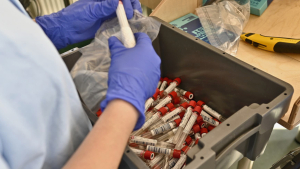It is estimated that air pollution costs more than 100 million healthy years of life worldwide. The causes of death include cardiovascular and lung diseases. This also increases. Inhaling fine dust with a particle size of up to 2.5 micrometers (pm2.5) is associated with brain loss, among other things, and a short -term exposure already reduces mental performance.
How exactly the mind suffers from particulate matter has been investigated by a german-Dutch research team. Does it enter the blood via the olfactory nerve or the lungs and in this way also into the brain? Or does the damage occur indirectly because reduced lung function lowers the oxygen content in the blood and thus causes vascular damage?
The group led by Gabriele Doblhammer from the University of Rostock examined data from lung function and cognitive tests of almost 50,000 adults from a long-term study in three northern provinces of the Netherlands. The particulate matter levels at the place of residence were estimated for at least ten years based on land use and measurements from 2010. Any other influences were also taken into account, including age, gender, income and previous illnesses.
By way of the blood, ultra-fine dust enters the brain.
As expected, air pollution slowed down mental performance. The average particulate matter concentration of 15 micrograms of PM2.5 per cubic meter of air was well below the EU-wide limit value of 25. In the case of poorer air – although below the EU limit – the performance in the cognitive tests was worse. More precisely: Ten micrograms more PM2.5 meant 20 percent slower processing, a measure of cognitive performance.
And for this, the fine dust did not have to damage the lungs first: it can directly affect the vital organs, according to the conclusion of the research team in the journal "Environmental Research". This direct effect accounted for around 98 to 99 percent, the indirect effect via the lungs only 1 to 2 percent. The ultrafine dust (with a diameter of less than 0.01 micrometers) can penetrate from the lungs into the blood and the central nervous system and cause inflammation there – a risk factor for neurodegenerative diseases such as Alzheimer's and Parkinson's.
Children's cognitive development is slowed by fine dust.
The consequences are already detectable in children: their cognitive development suffers, as researchers from Barcelona and Rotterdam showed. The group had tested children at 39 primary schools in Barcelona five times in four years. "We found slower development of working memory in children who attended schools with high levels of air pollution." The worst were elevated concentrations of nitrogen dioxide outdoors and ultrafine dust in buildings.
Fine dust can cause a child to get sick already in the mother's tummy. In Rotterdam, the air pollution at the place of residence of pregnant women hung together with the cognitive achievements of their children aged six to ten years. With an average of more than 20 micrograms of fine dust per cubic meter of air, the children later had a thinner cortex in several regions of the cerebrum, regardless of other influences such as socio-economic background.
The World Health Organization recently reduced its recommended limit values: from 10 to 5 micrograms PM2.5 per cubic meter of air on the annual average. The EU limit value is 25 and thus many times higher. Most major European cities can adhere to it - however, they exceed the threshold of the WHO, which meets the state of research on the consequences of the fine dust pollution much better.



















